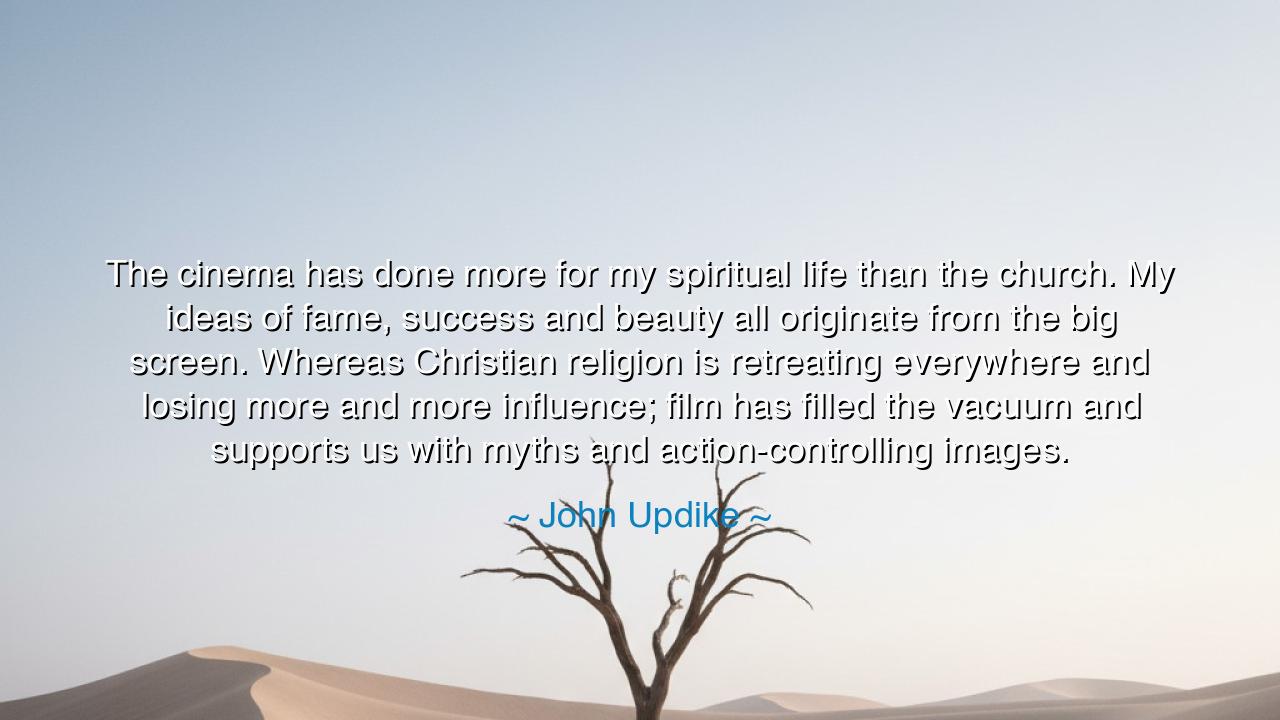
The cinema has done more for my spiritual life than the church.
The cinema has done more for my spiritual life than the church. My ideas of fame, success and beauty all originate from the big screen. Whereas Christian religion is retreating everywhere and losing more and more influence; film has filled the vacuum and supports us with myths and action-controlling images.






In the passage of time, the sacred and the secular have often stood in opposition, their roles in human life shifting with the winds of cultural and societal change. John Updike's words are a profound reflection on this shifting landscape, where the cinema—the modern-day storyteller—has taken the place of the once-dominant force of religion in shaping the spiritual lives of individuals. As Updike observes, the church, which once provided the framework for understanding the world, is increasingly in retreat, while the film has filled the vacuum, offering us myths, dreams, and images that influence how we see ourselves and the world around us. Through the lens of the big screen, we have come to form our ideas of success, beauty, and fame, reflecting a shift in how we seek meaning and guidance in an ever-changing world.
The power of cinema to shape the spiritual life of a people is not to be underestimated. In the ancient world, the gods of mythology were the guiding forces of human existence. Homer’s epics and the myths of ancient Greece served not only as entertainment but as a profound means of understanding the human condition. These stories provided models of virtue, heroism, and tragedy—images that shaped how the people viewed their place in the cosmos. Similarly, cinema today functions as a modern mythology, crafting larger-than-life figures and narratives that influence the collective psyche. Fame, once reserved for gods and kings, is now embodied in actors and celebrities, whose lives are consumed by the masses, shaping our aspirations and dreams. The mythological narratives of film have become the new religion, offering us heroes to emulate, villains to condemn, and ideals to strive for.
Consider the powerful influence of figures like James Dean or Audrey Hepburn, whose personas were crafted not by the will of gods, but by the film industry. These icons became models of beauty, success, and virtue for an entire generation. Their images were etched into the cultural consciousness, shaping the desires, aspirations, and dreams of millions. In the same way, the hero's journey depicted on the screen—be it through the tales of superheroes or the struggles of underdog characters—becomes a modern myth, providing a narrative framework for us to understand our own struggles and triumphs. The big screen has become a new temple, one where the faithful come to worship not the divine, but the ideals of success, beauty, and glory.
In contrast, the church—once the central institution that shaped societal values and provided moral guidance—has lost much of its sway over the masses. Christianity, once a dominant force, now finds itself in retreat, especially in the face of the new myths created by cinema. Where once the church provided a clear path to salvation, with doctrines that told its followers how to live virtuously and achieve a sense of divine purpose, the film industry offers a far more enticing, yet often superficial, alternative. The messages conveyed through film are often not about moral righteousness or divine grace, but about personal achievement, the pursuit of fame, and the triumph of individual will. This shift reflects a broader change in how people seek meaning, no longer relying on spiritual or religious frameworks but instead turning to the images and stories that dominate modern culture.
We can see this transformation in the stories that captivate the modern world. The superhero films, which dominate the box office, are not just about action and entertainment, but about the quest for power, justice, and heroism. These films serve as modern-day parables, where good and evil are clearly delineated, and where the individual is often called to a higher purpose. Much like the ancient myths, these stories reflect the human desire for meaning in a chaotic world. Yet, they also reflect the growing individualism in modern culture—where the journey to success is often framed as a personal one, and the community becomes secondary to the self.
In these changing times, John Updike’s reflection offers us a crucial lesson: the stories we tell, whether through the church, the cinema, or any other medium, shape our understanding of the world and our place within it. The myths we embrace, the ideals we worship, and the images we consume have profound consequences for our lives. Cinema, like religion, offers us a mirror into our deepest desires and fears. However, it also brings with it the danger of reducing spiritual life to entertainment, of focusing on superficial beauty and fame rather than true fulfillment and deeper meaning.
The challenge, then, is not necessarily to abandon the cinema or the entertainment it provides, but to recognize its place in our lives and to seek a balance between the myths it offers and the deeper, more lasting truths of life. Let us not fall prey to the illusion that fame or success, as depicted on the big screen, is the ultimate goal. Instead, let us seek to cultivate the spiritual wisdom, compassion, and understanding that endure beyond the fleeting images of cinema. In doing so, we might find a deeper, more meaningful path that integrates the lessons of both ancient faith and modern myth, guiding us towards true fulfillment in a world that constantly evolves.






AAdministratorAdministrator
Welcome, honored guests. Please leave a comment, we will respond soon